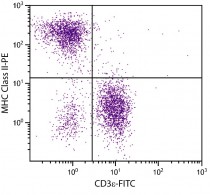ARG21059
anti-MHC Class II antibody [NIMR-4] (PE)
anti-MHC Class II antibody [NIMR-4] (PE) for Flow cytometry,ICC/IF,IHC-Frozen sections and Mouse
Overview
| Product Description | PE-conjugated Rat Monoclonal antibody [NIMR-4] recognizes MHC Class II |
|---|---|
| Tested Reactivity | Ms |
| Tested Application | FACS, ICC/IF, IHC-Fr |
| Specificity | Mouse MHC Class II. The clone NIMR-4 reacts specifically with a non-polymorphic I-A-encoded epitope on MHC Class II antigens. Class II antigens are predominantly expressed on antigen-presenting cells including B lymphocytes, macrophages, dendritic cells, and certain epithelial cells. |
| Host | Rat |
| Clonality | Monoclonal |
| Clone | NIMR-4 |
| Isotype | IgG2b, kappa |
| Target Name | MHC Class II |
| Antigen Species | Mouse |
| Conjugation | PE |
| Alternate Names | AI323765; H-2Ea; MHC-H2-Ea; H2-Ea; I-Ealpha; H-2 class II histocompatibility antigen, E-U alpha chain; Ia3; E-alpha-f; Ia-3 |
Application Instructions
| Application Suggestion |
|
||||||||
|---|---|---|---|---|---|---|---|---|---|
| Application Note | * The dilutions indicate recommended starting dilutions and the optimal dilutions or concentrations should be determined by the scientist. |
Properties
| Form | Liquid |
|---|---|
| Buffer | PBS, 0.1% Sodium azide and Sucrose. |
| Preservative | 0.1% Sodium azide |
| Stabilizer | Sucrose |
| Concentration | 0.1 mg/ml |
| Storage Instruction | Aliquot and store in the dark at 2-8°C. Keep protected from prolonged exposure to light. Avoid repeated freeze/thaw cycles. Suggest spin the vial prior to opening. The antibody solution should be gently mixed before use. |
| Note | For laboratory research only, not for drug, diagnostic or other use. |
Bioinformation
| Database Links |
GeneID: 100504404 Mouse H2-Ea-ps Swiss-port # P14439 Mouse H-2 class II histocompatibility antigen, E-U alpha chain |
|---|---|
| Gene Symbol | H2-Ea-ps |
| Gene Full Name | histocompatibility 2, class II antigen E alpha, pseudogene |
| Background | This locus belongs to the class II major histocompatibility complex (MHC) family of genes, which encode immune response (Ia) antigens that function in the T-cell-dependent immune response. This family member has multiple haplotypes, some of which result in the production of an E-alpha subunit that combines with an E-beta subunit to form a functional E complex at the cell surface. Other haplotypes, including that of the reference genome allele, contain mutations and they thus represent polymorphic pseudogenes that do not produce functional products. These mutations include frameshifting indels, nonsense mutations, and deletions of larger regions. The reference genome haplotype contains a deletion at the 5' end of the gene, including the core promoter region and the transcription start site, and therefore no transcripts result from this haplotype. [provided by RefSeq, Aug 2011] |
| Calculated MW | 29 kDa |
Images (1) Click the Picture to Zoom In






